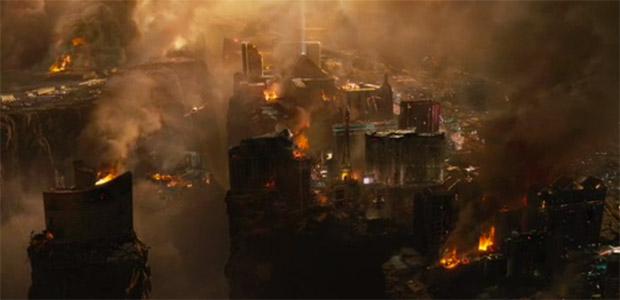As Mayan ‘end of the world’ nears, Chinese especially interested in preparing
The movie 2012, which depcited the end of the world on Dec. 21, 2012, was especially popular in China, which some say is the cause for that country’s interest in the end of the world. (Photo courtesy of Sony Pictures.)
By Mary Kay Magistad
If the Mayan calendar is to be believed, or rather, a largely discredited interpretation of it, it’s seven days until the Apocalypse.
What to do? Well, some people in many parts of the world are paying heed. In France, there’s a mountain where people are converging to await the arrival of aliens. In Russia, there’s been a run on essential supplies.
But according a survey conducted for Reuters earlier this year, China ranks highest when it comes to end-of-the-world fears. Some 20 percent of those surveyed expected something to happen on Dec. 21.
Just this week, my housekeeper, Hou Jinrong, asked me if I think it’s true that the world will end next week.
“I heard it’s the end of the world. If the world still exists, there would be no sunlight. So now people in the countryside, every family is rushing to buy candles and store those candles at home,” Hou said.
She said that includes her own relatives, back in her village in the central province of Henan. She thinks they’re being a little superstitious — but maybe not entirely.
“I cannot tell them not to do it, because I don’t know whether it’s true,” she said. “If it’s true, they’ll blame me for that.”
You have to give people points for optimism when they think the end of the world would still leave both them and their family members alive and well, and able to continue to scold each other.
In China, the concern that everything might come to a skidding halt on Dec. 21 came in part from the movie “2012,” which was a smash hit here.
Add that to the mix in a place where rumors and panic have been known to spread quickly and where social networking turbocharges that process. There have already been more than 60 million posts on Weibo, China’s version of Twitter, about next week’s scheduled end of days.
Pang Yen Ting, a 17-year-old high school student in Beijing, says her friends are talking about it, and posting stories about it online.
“They just talk about who do you want to spend the last day with?” she said.
Pang says she wants to spend Dec. 21, with her family — just in case.
Just down the street, a young advertising copywriter named Guan Qiang pauses between drags on his cigarette and looks amused when I ask if he thinks the world will end in eight days.
Barely keeping a straight face, he tells me if CCTV — China’s Central Television — didn’t say so, so it can’t be true.
In other words, if CCTV, the government mouthpiece, isn’t calling the end of the world, move on.
But Guan admits that even some of his friends — educated, urban, young professionals — are laying in provisions.
“They say there will be three days when it’s going to be really cold, and people will spend three days in darkness,” he said.
After that, he says, it’ll be okay. There’s that mix of optimism and pragmatism again.
Others in China are making more elaborate preparations; one guy used his life savings to build an ark — like Noah.
Hou Jinrong is pretty stoic about the whole thing.
“Who knows what will happen? It might be an earthquake, or tsunami or volcano eruptions. You may die. You may not die,” Hou said. “When I was young, my mom told me the end of the world is going to be scary. A lot of weird things will happen.”
But Hou says she’s not scared of what might happen next week. She laughs.
“What’s the point of being scared?” she said. “I have to get on with my life.”
Still, she’ll have the candles. Just in case.
